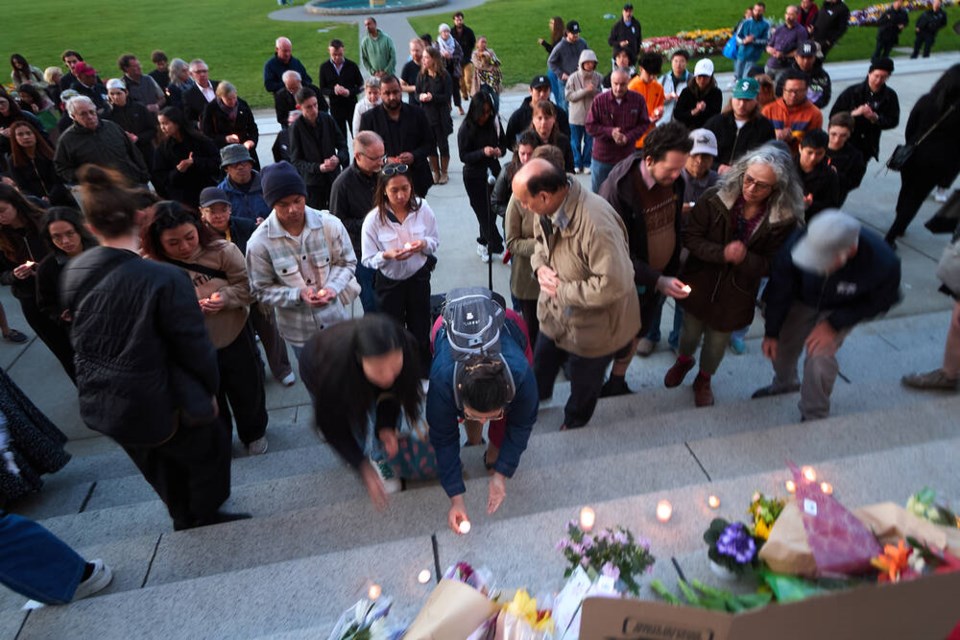Maybe this time it will be different.
All the other mental-health horror stories that make their way to the legislature involving deranged people inflicting ghastly harm on citizens follow a similar pattern.
The horrifying details are recounted by the opposition, then there’s a strident demand for action.
The government ministers express their heartfelt condolences, and then read briefing notes explaining how the system did the best it could under whatever circumstances developed.
The critics grow testy and demand better answers. The ministers get frustrated and retreat into their message boxes.
When enough cases pile up, there is some incremental progress toward addressing the problem. Last week’s opening in a jail of a 10-bed involuntary care unit for inmates with mental-health problems is an example.
But it’s a long, zigzag march towards any kind of progress.
Vancouver’s Lapu Lapu massacre may transcend those pro forma exchanges of views.
The government set a different tone from the start, cancelling most of Monday’s sitting out of respect.
Politicians from all sides joined together at vigils. Premier David Eby on Tuesday morning tried to get out in front of all the pleas for action, saying he is leaning toward a public inquiry if the court proceedings don’t adequately answer all the questions.
He got well out in front of those court proceedings as well, basically convicting the suspect at a news conference.
“The number one priority is … ensuring this man is held and tried and convicted for these murders.
“I think this individual is a mass murderer. I think he should be prosecuted to the full extent of the law.”
He told the legislature later: “I hope he spends the rest of his life behind bars.”
Eby acknowledged it will be up to a judge, but his views ignore the possibility of a “not criminally responsible on account of mental disorder” verdict eventually.
Eby’s remarks reflect the fact he spent the weekend in the midst of the sickening aftermath, talking to the devastated Filipino community.
He knows that the responsible agency’s opening position won’t satisfy anyone.
Vancouver Coastal Health — prompted by the government to release as much information as possible about the attack — said Tuesday that the person charged with multiple murders was under direct supervised care by a “mental health team” (repeat: team) at the time.
“The individual was being followed closely by his care team. Vancouver Coast Health will continue to review the file, but at this time, the best known information is that there was no indication of violence in this individual’s presentation to the team.
“To the care team’s knowledge, there was no recent change in his condition or noncompliance with his treatment plan that would’ve warranted him needing to be hospitalized involuntarily.”
But if someone can snap and kill 11 people while a dedicated team of experts who are following him closely see no red flags, then the whole approach needs to be rethought.
Eby said if the criminal investigation and trial don’t provide enough answers, then a public inquiry will dig deeper.
He said his preference at this point is to call an inquiry regardless of what the trial produces.
More immediately, there will be a quick review of safety protocols at public events, with findings expected before this summer.
Eby said an independent commission will review best practices to determine how to minimize risks.
Opposition Leader John Rustad also tried for a different tone, hoping politicians from all sides can come together and fight to make the changes needed.
“There is a huge time for grieving and also for answers. We need to know how to resolve this …”
“It’s incumbent upon all of us to be able to be there in support to find answers, to reassure the community that we stand with them and that we will be there.”
Interim Green Party Leader Jeremy Valeriote warned in the legislature about making “snap judgments and quick decisions for more policing, for incarcerating people who don’t look or act like we do.”
“I ask this house not to fall into that trap,” he said, as most mentally ill people are not violent and are more likely to be victims than perpetrators.
During question period, Eby and Rustad were notably gracious and cordial in acknowledging each other’s duties.
There will be an unusual emergency debate on mental health next week in the house, another indication of how seriously politicians are taking this nightmare.



